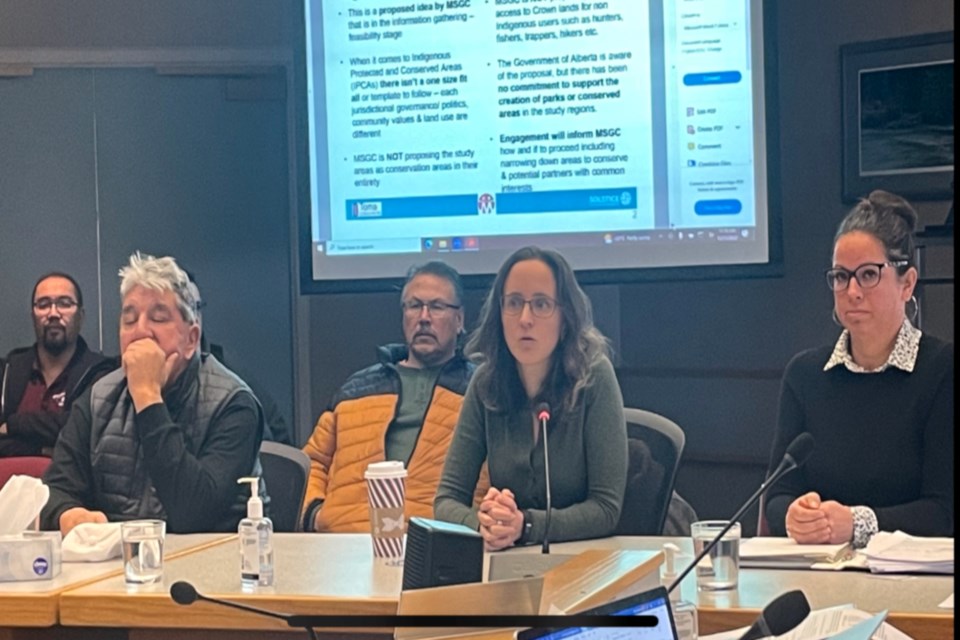ATHABASCA — No private landowner is going to lose their land.
That’s the message representatives from the Métis Settlements General Council (MSGC) reiterated to Athabasca County councillors during the regular council meeting Dec. 13 along with the Buffalo Lake Métis Settlement council, including chairman Stan Delorme, who sat at the table with MSGC representative Erin McGregor and Carrie Selin from Solstice Environmental Management.
“With all due respect, I feel like I’m sitting in a courtroom with my lawyers beside me,” quipped Delorme.
He said he wasn’t sure how the message was presented at a Grassland town hall Dec. 6 after speaking with Athabasca County reeve Brian Hall and Village of Boyle mayor Colin Derko Dec. 2.
“Dec. 2 is when we had the meeting and we did talk about the Métis Settlements General Council initiative on the IPCA (Indigenous Protected and Conserved Areas) and basically pointed out a few areas for clarity purpose with the two leaders and hoping that message would have been carried on to the meeting that was held in Grassland,” said Delorme.
McGregor noted Toma Consulting had attempted to connect with Athabasca County at least three times via e-mail but was unsuccessful but added the IPCA isn’t at a stage to conduct widespread stakeholder engagement.
“I'll start off by saying that what we're doing right now is a feasibility study. This project is still in very early stages. We are still in concept stage (and) we have not refined this into a plan that we can table with the Government of Alberta for proposal,” McGregor said.
She added the study does not have Government of Alberta support as of this time but is aware of what they’re doing and have been since 2019 contrary to what was stated at the Grassland town hall.
“But they have made no commitments and we've been very open about that because we have a lot of homework that we'd have to do first in order to table a proposal with them,” she said.
McGregor said there are other IPCAs across Canada and not to look at one and think they are all the same.
“IPCAs need to be thought of as on a spectrum and there's no one size fits all,” she said.
In a nutshell, IPCAs are established because the aboriginal community has concerns with the current land use, mainly industrial development and serve to conserve wildlife, fish, habitat, and water quality. Many Aboriginal communities view an IPCA as an opportunity to continue to practice their traditions of connecting with the land or gathering for social or ceremonial purposes.
“The engagement that's being conducted for the feasibility study will inform how we, as an organization, the Métis Settlements General Council, will be able to narrow down the areas of interest to specific tracts of land that they would like to pursue for potential conservation with the Government of Alberta and with partners,” said McGregor.
Study Area A is 290,000 acres of land around Wolf Lake and the Lakeland Provincial Park and Recreation area, and Study Area B is 30,000 acres surrounding Amisk Lake, North Buck Lake and Big Johnson Lake.
“A foundation of IPCAs is not just one community pushing it forward but seeing who else is interested in partnering on it,” she said. “The feasibility study was never intended to be broad public engagement. That is a step that will be way down the road. At this stage with the study areas engaging with every single landowner, having widespread public engagement on a concept is not what we intended because we don't have enough information to share at this juncture.”
At this stage, they're seeing if there are other historical users like hunters and trappers or others who would like to preserve the land as well.
“We understand that there's tourists, visitors, non-residents, recreational users, who access the region,” said Selin. “There's oil and gas activity, as I mentioned, and there's definitely some connections from an IPCA perspective to government policy, whether that's climate policy, water quality, quantity, (and) land use.”
“I must add, reeve Hall, by no means are we looking at private land,” Delmore said.
Athabasca County Coun. Ashtin Anderson still asked for that statement in writing 10 minutes later.
McGregor explained the stakeholder engagement study, of who could potentially partner on the IPCA will be done by Dec. 31, and the final feasibility study will be completed by March 31, 2023, and will be presented to the MSGC to consider possible next steps, if any.
A commitment to better communication between neighbours was suggested by Athabasca County Coun. Gary Cromwell.
“If neighbours knew what neighbours were doing and what the left hand is doing for the right hand, I think that we'd be having a very different meeting today if that would have happened,” he said.
Anderson also chided Delorme for not keeping the community informed even though Buffalo Lake Métis Settlement isn’t organizing the IPCA.
“For clarity, I was talking about the community engagement related to the IPCA,” she said.
McGregor stepped in and admitted the messaging got out of control early in the process and the MSGC is looking at ways to bring it back on track.
“We don't have a communications department or team, and this is also very new to us,” she said. “And so, I will take responsibility for the information not being as readily accessible.”
It was uncertain when more information would be available.



